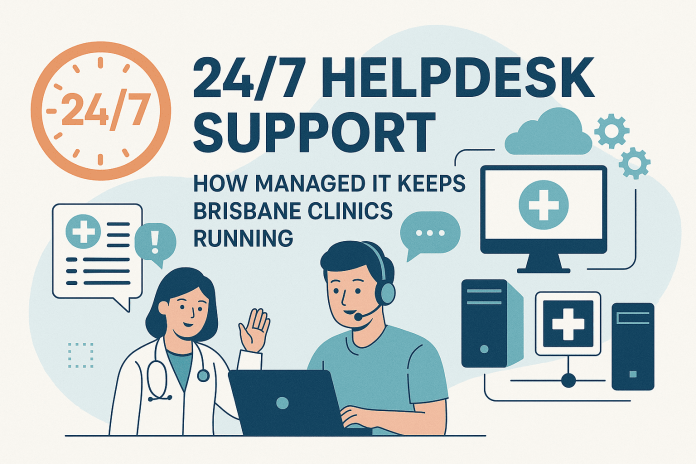Running a clinic in Brisbane means handling patients, staff, and complex medical systems around the clock. Any downtime in your technology can delay care, frustrate staff, and risk patient safety. That’s why 24/7 helpdesk support is crucial. By working with experts in healthcare IT services, clinics can keep their systems running, safe, and following rules without overloading their own staff.
What Is 24/7 Helpdesk Support?
24/7 helpdesk support means having skilled technicians available day and night to resolve IT issues as soon as they arise. Instead of waiting for business hours, clinics can call or log tickets anytime whether it’s a server error at 2 AM or a printer jam before the morning rush. This constant access reduces IT headaches and ensures that critical services stay online.
The Cost of Downtime in Clinics
When IT goes down, clinics face lost appointments, delayed lab results, and stressed staff. A single hour of downtime can cost thousands in revenue and damage a clinic’s reputation. With managed IT support, clusters of issues like network outages or software errors are fixed fast. Proactive monitoring alerts technicians to problems before they affect patient care.
How Healthcare IT Managed Services Help
By choosing healthcare IT managed services, Brisbane clinics get more than just ticket-based fixes. These services include network monitoring, patch management, data backups, and user support. A dedicated team watches your systems in real time, catching faults early. That means fewer emergency calls and less risk of losing critical patient records.
Reducing IT Headaches with Expert Teams
Many clinics lack the budget or staff to field an in-house IT department around the clock. Outsourced helpdesk teams fill this gap. When staff struggle with slow computers or login issues, they reach out and get fast answers. This wrap-around support cuts down on frustration and keeps workflows smooth, no more guessing why a system froze during a patient consultation.
Key Features of Managed IT Support for Healthcare
- Real-Time Monitoring: Automated tools watch servers, workstations, and network devices 24/7.
- Rapid Response: A helpdesk team answers calls or tickets within minutes.
- Secure Remote Access: Technicians can fix issues without needing on-site visits.
- Detailed Reporting: Regular performance reports highlight trends and areas for improvement.
- Scalable Support: Services grow with your clinic as you add locations or new medical software.
These features form the backbone of managed IT support for healthcare, ensuring every part of your digital environment runs as expected.
Ensuring Compliance with IT Compliance Services
Healthcare providers must meet strict data regulations to protect patient privacy. In Australia, clinics need to follow guidelines similar to HIPAA, plus local standards like the Privacy Act. IT Compliance Services keep your systems up to date with the latest security patches, encryption standards, and access controls. Regular audits and policy reviews help avoid fines and protect patient trust.
Proactive vs. Reactive Support
A reactive approach means fixing problems only after they occur. This can lead to longer downtimes and higher costs. In contrast, proactive helpdesk support identifies issues early. For example, a warning about disk space running low lets technicians free up space before a critical application fails. Proactive measures save time, reduce pain, and eliminate many common IT headaches.
Improving Patient Experience
Technology issues can directly affect how patients perceive your clinic. Slow check-in systems, interrupted video calls for telehealth, or missing test results frustrate patients. With Healthcare IT Support available around the clock, these hiccups vanish. Smooth operations from front desk to back office create a more positive, professional environment.
Real-World Impact: A Brisbane Clinic Case Study
One mid-sized Brisbane clinic saw its appointment management system crash twice in one week. Before switching to managed services, each crash took hours to resolve, costing the clinic over A$4,000 in lost billings. After adopting 24/7 helpdesk support, the network team spotted a server fault early, replaced a failing drive overnight, and avoided any appointment delays. Staff reported a 75% drop in daily support calls.
Choosing the Right Partner
Not all IT providers understand the unique needs of the healthcare sector. When evaluating vendors, look for experience in clinical settings, strong security credentials, and clear IT compliance services offerings. Ask about average response times, escalation procedures, and the scope of remote support. A good partner will align their services with your clinic’s goals and patient-care priorities.
Conclusion
Clinic operations never pause, and neither should your IT support. By investing in reliable healthcare IT managed services, Brisbane clinics can prevent downtime, solve problems quickly, and meet strict compliance requirements. A 24/7 helpdesk not only eases IT headaches but also enhances patient satisfaction and protects the clinic’s reputation. For any healthcare provider aiming for seamless service, managed IT support is an essential ally.


